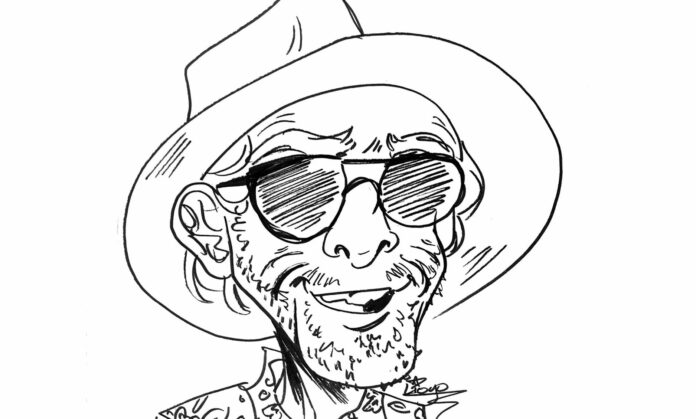It is a little after 4 a.m. Monday morning and I don’t have a column written for the noon deadline. In fact, I have only the words you are now reading on paper and no more in my head to follow with. So, I will resort to myriad notes on pieces of scratch paper in hopes you folks find something either interesting or entertaining in the few minutes it takes to read the following.
“Do unto others as you would have them do unto you.” My bet is many of you recognize those words from an early age when taught them in hopes of mutual harmony. The sentiment is from the New Testament, and is held as one of the most prominent aspects of Christian living. I grew up believing this was particular to Christianity and set it apart from other religions. Not true. Read on.
“Hurt not others with that which pains yourself.” Buddhism.
“Treat others as you would yourself be treated.” Hinduism.
“What you yourself hate, do to no man.” Judaism.
“Live in harmony, for we are all related.” Native American.
“Do as you will, as long as you harm no one.” Sacred Earth.
“Do unto all men as you would with to have done unto you.” Islam.
One must wonder how many precepts and ideas are shared by millions of people. If we can all agree upon one thing, then we should be able to agree on all things.
***
How many of us were raised with classical music in the home? How many pieces from great composers could most of us name? If you are a member of the Baby Boomer generation you may be surprised at how many selections you recognize even if not able to name the piece or its composer. Strauss’ “Tales from a Vienna Woods” or “The Blue Danube,” “Minute Waltz in D-flat” by Chopin, or “The Barber of Seville” and “The William Tell Overture” by Rossini are all classics. As are “Hungarian Dances” by Brahms and “Hungarian Rhapsody” by Liszt, “Beethoven’s 7th” by, well, Beethoven, and Wagner’s “Flying Dutchman,” “Pilgrim’s Chorus” and “Ride of the Valkyries.” And how, you ask, would all these classical compositions be known by us older folks? It is because they all, plus many others, appeared as supporting audio for a score of Looney Tunes cartoons.
***
“That which has been no longer is; it as little exists as does that which has never been. But everything that is in the next moment has been. Thus (sic) the most insignificant present has over the most significant past the advantage of actuality, which means that the former bears to the latter the relation of something to nothing.” (Author’s italics.) That pronouncement is from “The Vanity of Existence” by German philosopher Arthur Schopenhauer. Over the years I took enough philosophy classes that every so often I get the urge to venture back into the realm of the hard to understand; which many philosophical proposals and theories certainly are. And when ol’ Arthur wears thin, he is a bit in awe of himself at times, there is always Locke, Hulme, Kant, des Cartes and Nietzsche waiting in the wings. Locke, Britisher John Locke, that is, is one we all should look at once in awhile as he was a profound influence on both British and American life; our founding fathers incorporated much from Locke’s writings into our Declaration of Independence and Constitution.
***
I am now, once again, comfortable calling people of different North American tribes Indians after years of using Native American to reference them. I choose to align myself with the late great George Carlin who pointed out that, firstly, the peoples of North and South America are not native; they along with others all came from the Great Rift Valley of Africa. Secondly, when Christopher Columbus came upon these people, he did not call them Indians because he thought he had reached India — India in 1490 was called Hindustan — but the word derived from his description of these people, referring to them as “un gente en Dios” (a people in God, or God’s people); “en dios” indios, Indians.
***
The sun just peeped over the eastern horizon and with it enough daylight to display the Stars and Stripes on this Memorial Day. And for the first time in I don’t know how many years, decades, really, I am not involved in any remembrance ceremonies. Many times in Southern California I accompanied my mother, S/Sgt. Wilma Willis, USWMC, WWII, who as president of the Palms to Pines Charter of the Women’s Marine Corps Association placed a wreath alongside other services wreaths at the Riverside National Cemetery; where both she and my father are interned. Following a practice from my elementary school years, for the past decade I have read the names of interned service members in both Greenfield cemeteries and recited the poem “In Flanders Fields.” I also recited the poem last year here during King City ceremonies. But appearance and enunciation/pronunciation matters have brought public speaking to a slowdown, if not a halt, so for today (two days ago now) I’ll stay close to the house.
***
For those locally who attended KCHS between the years 1959 through 1992, you will surely remember our librarian, Theresa Richardson; if not a student, then a friend or neighbor or associate of she and husband Corky. The high school has decided to honor Theresa by placing a plaque near each of the two main library doorways with appropriate inscription. The dedication ceremony will take place at tonight’s school board meeting, starting at 6:30 p.m. It would be a nice gesture for as many as possible to attend tonight in support of this honoring of a lady many of us knew as a genuinely nice person who cared about our futures. It is one public event I will make it to, and hope you do too.
Take care. Peace.













